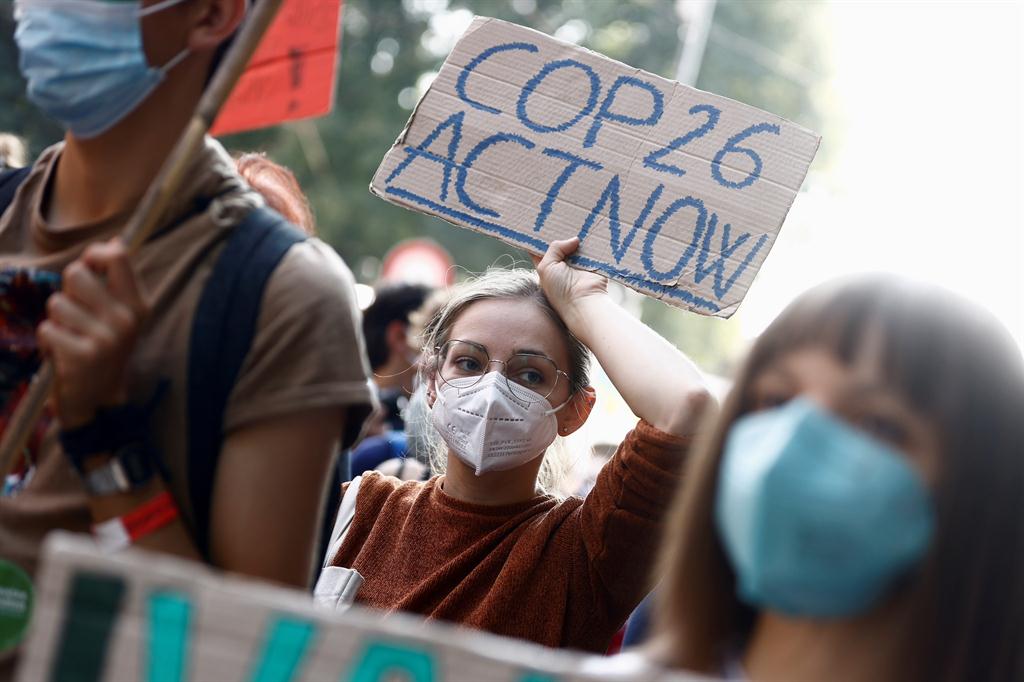Countries vow to exit oil and gas at COP26
The US state of California is also among a wider group signed up to measures to restrict fossil fuel supply.
A handful of nations committed to phasing out oil and gas production at the COP26 summit Thursday, in what organisers Denmark and Costa Rica hope will inspire a global movement towards ending fossil fuels.
The coalition, which includes a dozen countries, was announced as nations tussle over a range of issues in the final stages of the UN climate talks in Glasgow.
The UN summit aims to implement the Paris Agreement, which has a target of limiting global warming to 1.5 degrees Celsius. To do that, scientists say the use of oil and gas must be radically slashed.
The Beyond Oil and Gas Alliance (BOGA) counts France and Greenland among its core members, committing to end new oil and gas exploration and extraction and set a Paris-aligned date for ending production.
The US state of California is also among a wider group signed up to measures to restrict fossil fuel supply. "Now we extend the challenge to others," said Danish Climate, Energy and Utilities Minister Dan Jorgensen.
Denmark, which is among the largest oil and gas producers in Europe, said it will phase out production by 2050 and cancel all future licencing rounds. "The fossil era must come to an end," said Jorgensen.
"But just as the Stone Age did not end due to lack of stone, the fossil era will not end because there's no more oil left in the ground. It will end because governments decided to do the right thing."
The initiative was welcomed as a first step that would need the buy-in of more oil producing nations to have an impact.
"This is a welcome and vital initiative to accelerate an end to the age of fossil fuels," said Bob Ward, of the Grantham Research Institute on Climate Change and the Environment at the London School of Economics and Political Science.
"Logically, every country that has now set a 2050 net zero target, including the UK and United States, should be joining this alliance."
The UN's Intergovernmental Panel on Climate Change in its special report on 1.5C, offered estimates of how much fossil fuel use needed to decline in order to hit the temperature cap.
Absent large-scale deployment of untested technology, it said that oil use needed to fall 37 percent by 2030 and 87 percent by 2050. Gas would need to fall by 25 percent by 2030 and 74 percent by 2050, and coal use would need to fall 97 percent by mid-century. -Nampa/AFP
The coalition, which includes a dozen countries, was announced as nations tussle over a range of issues in the final stages of the UN climate talks in Glasgow.
The UN summit aims to implement the Paris Agreement, which has a target of limiting global warming to 1.5 degrees Celsius. To do that, scientists say the use of oil and gas must be radically slashed.
The Beyond Oil and Gas Alliance (BOGA) counts France and Greenland among its core members, committing to end new oil and gas exploration and extraction and set a Paris-aligned date for ending production.
The US state of California is also among a wider group signed up to measures to restrict fossil fuel supply. "Now we extend the challenge to others," said Danish Climate, Energy and Utilities Minister Dan Jorgensen.
Denmark, which is among the largest oil and gas producers in Europe, said it will phase out production by 2050 and cancel all future licencing rounds. "The fossil era must come to an end," said Jorgensen.
"But just as the Stone Age did not end due to lack of stone, the fossil era will not end because there's no more oil left in the ground. It will end because governments decided to do the right thing."
The initiative was welcomed as a first step that would need the buy-in of more oil producing nations to have an impact.
"This is a welcome and vital initiative to accelerate an end to the age of fossil fuels," said Bob Ward, of the Grantham Research Institute on Climate Change and the Environment at the London School of Economics and Political Science.
"Logically, every country that has now set a 2050 net zero target, including the UK and United States, should be joining this alliance."
The UN's Intergovernmental Panel on Climate Change in its special report on 1.5C, offered estimates of how much fossil fuel use needed to decline in order to hit the temperature cap.
Absent large-scale deployment of untested technology, it said that oil use needed to fall 37 percent by 2030 and 87 percent by 2050. Gas would need to fall by 25 percent by 2030 and 74 percent by 2050, and coal use would need to fall 97 percent by mid-century. -Nampa/AFP





Kommentar
Allgemeine Zeitung
Zu diesem Artikel wurden keine Kommentare hinterlassen